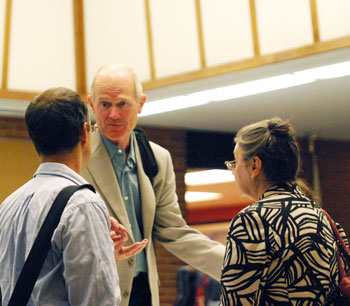Short Council Meeting Hits Emotional Topics
Ann Arbor city council meeting (Aug. 19, 2013): An extraordinarily light agenda prompted Jane Lumm (Ward 2) on arrival in council chambers to remark that the meeting could be done in a half hour. The meeting actually stretched to about 90 minutes. But that still made it the shortest meeting in recent memory.

There was time for conversation after the council meeting. From right: Chuck Warpehoski (Ward 5), mayor John Hieftje, and Sabra Briere (Ward 1) (Photos by the writer.)
The council didn’t engage in substantive deliberations on any of its regular business items, but did pull three items off the consent agenda for more scrutiny: (1) an Oktoberfest street closure in downtown; (2) a dam safety inspection contract for the city’s two hydroelectric dams; and (3) a renewal of the maintenance and support agreement for CityWorks software.
The CityWorks software drew public commentary from resident Kathy Griswold – because the web-based citizen request system that a third-party developed a few years ago using the CityWorks API (application programmer interface) does not have a good mobile interface. To the extent that a better mobile interface would allow residents more easily to report problems with traffic-related lines of sight (such as excessive vegetation), that could result in safety improvements.
Pedestrian safety was the second point raised by Griswold, as she weighed in against the city’s crosswalk ordinance, which requires motorists to stop for pedestrians who are in the crosswalk or standing at the crosswalk. It’s a position that Griswold has taken on several occasions in her remarks to the council over the last two years. Her contention is that the city’s ordinance should be identical to the language in the Michigan Uniform Traffic Code, which does not require stopping and does not extend to cover pedestrians who are standing at a crosswalk but not within it.
Sabra Briere (Ward 1) picked up on the topic of pedestrian safety during communications time, and delivered remarks she’d prepared at the request of former city councilmember Leslie Morris. Morris had attended the previous day’s Sunday night caucus and had asked Briere to address the issue of a recent pedestrian fatality on Plymouth Road. Briere ticked through a number of statistics on traffic crashes involving a pedestrian.
The meeting featured two topics related to constitutionally protected speech – one raised during public commentary and the other raised less visibly, during a closed session on the settlement of a lawsuit.
During his turn at public commentary, James Rhodenhiser asked the council to consider expressing its view on a regular weekly anti-Israel protest that’s been held for nearly 10 years outside the Beth Israel Congregation. Rhodenhiser is rector at St. Clare of Assisi Episcopal Church, and conveyed a written document to the council indicating support from 31 other local clergy. The council has in the past approved two resolutions referring to the protests. The city has not been able to take any substantive action to compel the protesters to cease their activity, because the demonstration is constitutionally-protected free speech.
Another issue related to constitutionally-protected speech was the topic of a closed session held near the end of the meeting, which lasted about 15 minutes. When the council emerged from the closed session, a unanimous vote was taken to settle a lawsuit: Dobrowolski v. City of Ann Arbor. The lawsuit alleged that the city infringed on constitutionally-protected speech when it used its vehicle sign ordinance to prohibit anti-abortion signs. The city agreed to pay $7,000 in legal fees and $50 to the plaintiff, Paul Dobrowolski – to cover the tickets he was issued for his signs.
In some significant voting business, the council confirmed appointments to the boards of the Ann Arbor Downtown Development Authority and the Ann Arbor Area Transportation Authority. Sally Petersen (Ward 2) offered positive remarks about both appointees – Rishi Narayan to the board of the Ann Arbor DDA and Jack Bernard to the board of the AAATA.
Petersen highlighted one other appointment – Alison Stroud to the city’s commission on disability issues, noting that Stroud is hearing impaired and used the CART (Communication Access Realtime Translation) to follow along at meetings. [Full Story]



